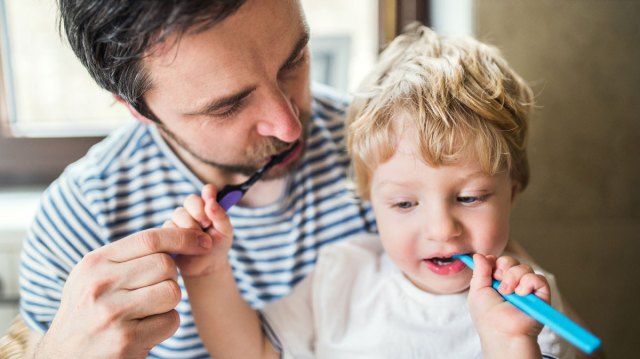If you have a toddler who hates brushing their teeth, these expert tips will help make it less scary—and maybe even a little bit fun
As we all know, setting a good example for good oral hygiene starts in the toddler years—but that’s easier said than done. Toddlers are infamous for their hatred of tooth brushing, making for a daily battle that can feel unwinnable for parents. If this sounds familiar, you’re going to want to watch this TikTok video and pick up some expert tips for making the act less torturous for everyone involved.
@learntotalkwithme 🪥Lots of children hate toothbrushing because it is something happening to them. That feels scary and unpredictable. When they fight, they are trying to protect themselves. 🪥 We can help toddlers feel safe and in control during something that has the potential to be so invasive. 🪥 I like to start by handing over the toothbrush and letting a child explore independently. It will not be as efficient as if they were to let you do it start to finish, but this is just the first step in the process-it is a means to an end. 🪥Then, if available, I’d like to bring more than one toothbrush to the party! Let your child hold one in each hand and then you have your own. Do this in front of a mirror so your child can see exactly what it looks like when they move it around in different ways and let them have a turn brushing your teeth, so they weren’t even more by watching. 🪥Last, use either counting or lines in a song to give them an idea of when it will start and when it will end. Young children will not understand a lengthy explanation of why we have to brush our teeth and how our teeth will get cavities, etc. etc… They will understand the start and end to a predictable song or sequence of words. 🪥You will be surprised at how much more your child enjoys toothbrushing if you give them some autonomy and control over the process! 🪥These tips are based on my mentor Marsha Dunn Klein’s Toothbrushing 1-2-3 approach. #toothbrushing #brushyourteeth #babyteeth #oralcare #newmom #toddlermom #toddlerparenting #toothbrushing123 #gentleparenting #autonomy #responsivefeeding #toddlerdad #toddlersofinstagram #toddlerbattles #toothbrush #toothpaste
♬ original sound – Learn to Talk with Me
The video comes from Stephanie Cohen, a licensed and certified speech-language pathologist and feeding specialist, who walks us through three easy tips for making tooth brushing so much easier when your toddler is, shall we say, resistant to the idea.
“Lots of children hate toothbrushing because it is something happening to them. That feels scary and unpredictable,” she writes in the caption. “When they fight, they are trying to protect themselves.”
With that context, the tips are all about helping kids feel like they’re part of the process and that they have some control over brushing their teeth.
1. Give your toddler the toothbrush.
The first tip is simple: “Hand over the toothbrush.”
“Let your child have it. Let them control it. Let them be the one to put it in their own mouth,” Cohen says. “Yes, they’re not going to do as good of a job as you would. They’re not going to be as thorough. But this is a means to an end. This is just the first step.”
2. Add a few more toothbrushes to the mix.
That brings us to the second tip, which is to get more than one toothbrush if you can—Cohen says the ideal number is two for your child (one for each hand) and one for you.
“This has a really powerful effect on how your child feels because they’re part of what you’re doing,” she explains. “They can put the toothbrushes in their own mouth. Do it in front of the mirror so they can see what it feels like when they move it in different ways. I would even let them brush your teeth. How powerful do you feel as a little person to be able to brush your big person’s teeth?”
3. Sing or count to give them a sense of timing.
Finally, the last tip is to use either counting or a song when brushing. This helps your toddler know how long the brushing will last and when it will end, which eases their anxiety about feeling out of control of the process. So counting, “1, 2, 3” and then taking a break can work—but Cohen emphasizes that it’s really important to give them the break when you say you’re going to in order to help build trust.
“You will be surprised at how much more your child enjoys toothbrushing if you give them some autonomy and control over the process!” she says.











